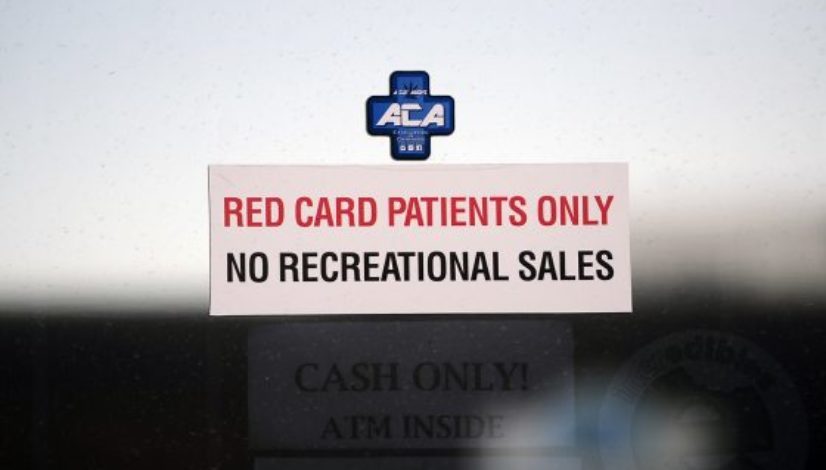Federal marijuana law enforcement: What you need to know
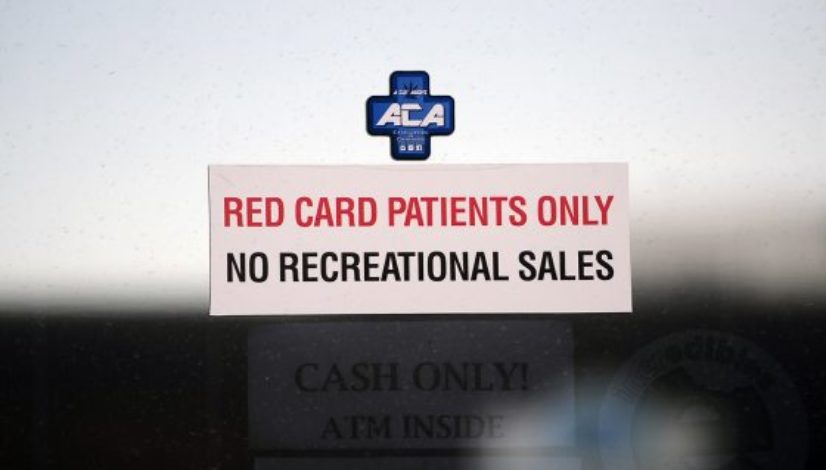
Published: Mar 7, 2017, 9:20 am • Updated: Mar 8, 2017, 7:38 am
By Alicia Wallace, The Cannabist Staff
No official federal policy change toward marijuana has been made — yet.
Under the specter of a potential crackdown, officials in recreational marijuana states have been proactive in recent days, including Colorado Attorney General Cynthia Coffman inviting Department of Justice head Jeff Sessions to take a firsthand look at America’s longest-operating recreational market, and Oregon lawmakers introducing a bill to protect consumers’ privacy.
What’s the next step for the feds? The Cannabist talked with several law and drug policy experts, industry observers and state officials about what changes in federal enforcement could look like — from the threat of raids on cannabis businesses and seizure of state-collected pot taxes to court issues and the ways Colorado regulations have developed.
Marijuana in the age of Trump: A Cannabist special report
Part 1 | ‘Something’s going to have to give’: An untenable conflict between feds, states
Part 3 | What is the Supremacy Clause and what does it mean for states’ rights to legalize marijuana?
If the Justice Department wanted to send a message that the federal prohibition of marijuana is going to be enforced, raids are an option, but all the agency has to do is write letters, said Jonathan Caulkins, professor of operations research and public policy at Carnegie Mellon University in Pittsburgh and former co-director of RAND’s Drug Policy Research Center.
Putting ink to paper and telling operators in recreational marijuana that they have to shut down within 30 days or face criminal prosecution and asset seizure, could be viewed as a credible enough threat that the government could effectively shut down the industry without many arrests and little to no incarceration, he said.
“It’s very hard to shut down a black market,” Caulkins said. “It’s easy to shut down a legal company with a fixed address and fixed assets.”
It’s practically a “slam-dunk,” he said.
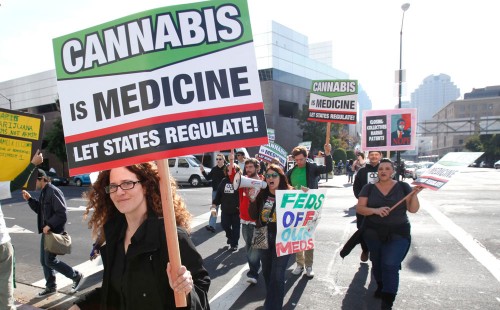 Demonstrators march in November 2011 to protest the federal government’s crackdown on California medical marijuana dispensaries during a rally in Sacramento, Calif., at the Robert T. Matsui Federal Courthouse. (Rich Pedroncelli, Associated Press file)
Demonstrators march in November 2011 to protest the federal government’s crackdown on California medical marijuana dispensaries during a rally in Sacramento, Calif., at the Robert T. Matsui Federal Courthouse. (Rich Pedroncelli, Associated Press file)
Such a tactic was employed in 2011-12 in a federal crackdown in California that led to the closure of hundreds of medical marijuana dispensaries.
The door would be open for the feds to seize money collected by state and local governments in their oversight of legal marijuana operations, said Zachary Bolitho, a former federal prosecutor with the U.S. Attorney’s Office for the Eastern District of Tennessee and now a professor at the Campbell University School of Law in Raleigh, N.C.
“Technically speaking, the money that is being derived from (marijuana regulatory systems) is criminal proceeds,” he said. “And, technically speaking, there’s an argument that’s forfeitable.”
What may be a legal possibility could be different from a political reality.
The actuality of the federal government disgorging Colorado of funds that since have been allocated elsewhere is not likely, he said.
Who will prosecute pot cases?
Others suggest that some limited, concerted actions could be more than enough to stifle a bustling industry.
Seeing a sledgehammer can drastically affect people’s behavior, said Sam Kamin, the Vicente Sederberg professor of marijuana law and policy at the University of Denver’s Sturm College of Law.
Related stories
- Oakland reserves marijuana biz permits for people who served time for weed
- LA Sheriff, preparing for recreational marijuana legalization, thinks feds may target California
- Los Angeles voters pass marijuana regulation Measure M by wide margin
- Judge allows hundreds of disputed Humboldt County marijuana biz permits to be considered
- ‘Something’s going to have to give’: An untenable conflict between feds, legalized states
“Can they arrest every person? Of course not,” Kamin said. “Can they make life very unpleasant for a few high-profile actors? Would it have a chilling effect? Yes.”
Given the industry’s rapid development in just a few years and legalization’s increasing popularity among the public as a whole, attacking the marijuana industry “would seem like an odd fight to pick at this particular political moment,” Kamin said.
In making direct enforcement actions, the federal government could be wading into uncharted territory, he said, noting that the the Justice Department likely would have to do so without the full cooperation of state and local law enforcement.
If those prosecutions occur and come to trial, the chances of success may be lower, Bolitho said. They would go before a jury pool in locales where public opinion weighed heavily in favor of legalization, he said.
And then there’s the matter of immediately finding willing U.S. attorneys to initiate those prosecutions, said Robert Mikos, a Vanderbilt Law School professor who specializes in the topics of federalism and drug law.
The Trump administration has not yet replaced the U.S. attorneys from the 94 different districts across the nation, he said.
For the time being, there are holdovers — mostly from the prior administration — who may not share Sessions’ antipathy toward marijuana and be resistant toward any edicts from his office, Mikos said. Attorneys who clamp down on marijuana in their state might not be too popular when their turn in office is over, he added.
It’s possible that the Department of Justice could have a new marijuana policy in place by summer, newly appointed U.S. attorneys by fall, and then initiate prosecutions, which could be months-long processes, Mikos speculated.
“And all the industry has to do is keep those actions going for a few months,” he said.
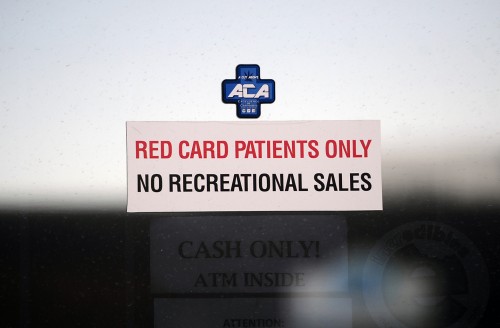 This sign hangs is on display at A Cut Above, a Denver medical-only shop in the “Green Mile” a stretch of marijuana shops on Broadway, in April 2016. (Vince Chandler, Denver Post file)
This sign hangs is on display at A Cut Above, a Denver medical-only shop in the “Green Mile” a stretch of marijuana shops on Broadway, in April 2016. (Vince Chandler, Denver Post file)
There would be a high practical cost to enforcement, Mikos said, adding that the actions would consume a lot of resources from an agency without a wealth of them. And there’s the question of delineating between medical marijuana and recreational and where that would leave a state such as Colorado, where those operations are often intertwined, he said.
“All it may ultimately succeed in doing is driving the industry underground for a short time until we get a new president or until we get a new Congress in less than two years,” he said.
“A tightening” of Obama-era guidelines
Bolitho suggested that the Trump administration might not be entirely heavy-handed.
“I don’t think you’re going to see a return to the aggressive enforcement that existed prior to (President Barack) Obama,” he said. “My suspicion, or guess, is you’re going to see a modification of the Obama administration’s policy — a tightening.”
In 2013, the Justice Department set forth eight guidelines – a.k.a. the Cole Memo – to address voter-approved legalization of adult-use marijuana in Colorado and Washington and prioritize federal enforcement in the following areas:
- Prevent distribution of marijuana to minors;
- Prevent marijuana revenue from funding criminal enterprises, gangs or cartels;
- Prevent marijuana from moving out of states where it is legal;
- Prevent use of state-legal marijuana sales as a cover for illegal activity;
- Prevent violence and use of firearms in growing or distributing marijuana;
- Prevent drugged driving or exacerbation of other adverse public health consequences associated with marijuana use;
- Prevent growing marijuana on public lands;
- Prevent marijuana possession or use on federal property.
Following the recent statements by White House spokesman Sean Spicer and Sessions regarding recreational marijuana, industry groups and politicians alike shot out a flurry of prepared statements and press releases supporting regulated legal marijuana. Amid that fray were voices of dissension.
“We’re hopeful that the Trump administration will pursue a smart approach to enforcement that prioritizes public health and safety over political ideology,” Kevin Sabet of Smart Approaches to Marijuana said in a statement.
Officials for the Centennial Institute, a conservative think tank overseen by Colorado Christian University, expressed their support for greater enforcement on recreational marijuana. Calling for the Trump administration to use “every federal resource available to limit the spread of recreational marijuana,” the organization made six recommendations:
- Use federal agencies to stop the black-market cultivation and sale of recreational marijuana in Colorado and the illegal transfer of marijuana to other states;
- Increase penalties for illegal marijuana operations on federal land;
- Fund public anti-marijuana awareness campaigns along the lines of anti-smoking campaigns to reduce marijuana use especially among youth;
- Fund federal research on the impact of marijuana especially as it relates to psychological and prenatal development;
- Maintain DEA classification of marijuana as a Schedule I substance and prohibit banks and credit unions from taking marijuana money;
- Withhold federal education money from schools with drug use above the national average.
Those actions would allow the government to act within the bounds of current state laws, as the “recriminalization” of recreational marijuana is a states’ rights issue that ultimately rests with the citizens of Colorado, Centennial Institute director Jeff Hunt told The Cannabist.
The Centennial Institute cited data from the Rocky Mountain High Intensity Drug Trafficking Area that showed highway patrol seizures of marijuana from Colorado increased 37 percent to 394 in 2015 from 288 in 2013.
“We wanted to make sure that the Trump administration saw that there was support from people in Colorado” for enforcement of federal law, he said, and later added: “You’re going to see the Centennial Institute take a far more proactive role in highlighting what’s happening with Colorado in the legalization of recreational marijuana.”
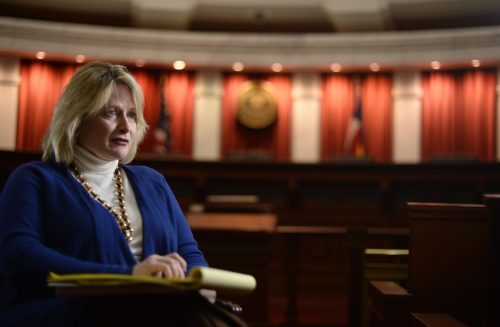 Colorado Attorney General Cynthia Coffman at the State Supreme Court Chambers at the Colorado State Judicial Building in Denver on Oct. 22, 2015. (Denver Post file)
Colorado Attorney General Cynthia Coffman at the State Supreme Court Chambers at the Colorado State Judicial Building in Denver on Oct. 22, 2015. (Denver Post file)
Coffman, Colorado’s top law official who has previously stated she would uphold her state’s marijuana laws, said she believes that the Trump administration is still figuring out its approach to legal marijuana.
Her gleaning of Sessions’ marijuana-related statements was that the state would see increased federal enforcement at its borders to prevent diversion out of state, Colorado Public Radio reported.
Colorado regulation evolution
Coffman, Colorado Gov. John Hickenlooper and Mark Bolton, marijuana adviser to Hickenlooper, have said their state’s first-of-its-kind regulations could withstand federal action.
“The primary safeguard I think we have is a strong regulatory system,” Bolton told The Cannabist. “I think we recognize that the federal government can come in and enforce the Controlled Substances Act — to the extent they have the resources.”
Related stories
- Colorado marijuana sales holding steady with $109 million in January 2017
- Weed 101: This Colorado university’s cannabis classes keep growing
- Colorado Senate passes first-in-nation pot clubs bill
- Colorado governor pledges to veto pot clubs bill unless changes made
- Colorado’s high plant limit helps state’s sickest patients, but there’s a dark side
The state’s priorities have been to build a regulatory system that protects public safety, protects public health, keeps marijuana out of the hands of children, and supports law enforcement in its resources and efforts, Bolton said. The system was created to both align with the Cole Memo, and also serve as an example for and beyond those 2013 federal guidelines for marijuana enforcement, he added.
Bolton was quick to remind that Colorado has been creating guidance, boundaries and rules for something that had never been regulated before. Where there have been shortcomings, the state has tried to quickly adjust, he said.
“We’re sort of building this airplane as we’re flying it…” he said, quoting former Colorado marijuana czar Andrew Freedman. “There have been challenges that have come up throughout this process, and I think we’ve had to respond. We’ve been reactive and we’ve done that.”
Colorado officials want to collaborate with the federal government to address any concerns, Bolton said.
“We’re hopeful that we can continue this experiment,” he said, noting U.S. Supreme Court Justice Louis Brandeis’ remarks in 1932 that states are the “laboratories of democracy.”
“We think the time and effort and work into building this system is paying off,” Bolton said.
Topics: California, Colorado, federal enforcement, federal law, federal seizure, forfeiture, medical marijuana, recreational marijuana, states rights, supremacy clause, Trump administration, U.S. constitution’s supremacy clause
 Alicia Wallace
Alicia Wallace
Alicia Wallace joined The Cannabist in July 2016, covering national marijuana policy and business. She contributes to the Denver Post’s beer industry coverage. In her 13 years as a business news reporter, her coverage has spanned the economy, Sports…

